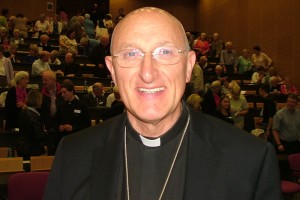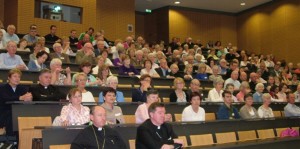
By Susan Gately - 10 July, 2015

Bishop Dominique Rey, bishop of Fréjus, Toulon France
The new context the Church is living in today calls for different roles for priests in evangelisation according to the Bishop of Fréjus, Toulon in France.
Addressing a conference earlier this week on the topic The Role of the Priest in Evangelisation, Bishop Dominique Rey said the Church is not a reality at one with the society around it even in countries that were evangelised centuries ago.
Traditional ‘markers’ of human life based around Gospel values are now gone.
“The Gospel must be offered to a radically new world,” he said.
This is a world characterised by a huge drop in the number of priests, secularism, the rise of Islam and a weakened family. The challenge is for everyone and every [parish] church to become an agent of evangelisation.
The most important instrument for mission is prayer, he told participants at the Third Annual Gathering of Catechism Studies in St Patrick’s College Maynooth.
“The Holy Spirit is the first player in the mission of the Church. He precedes and prepares our work.” Those evangelising had to give a witness to holiness. “Saints are the greatest evangelisers,” said Bishop Rey.
The bishop felt his call to priesthood through the Emmanuel Community, a non-residential community made up of people of all vocations and walks of life who live a radical fraternity based on Eucharistic adoration, compassion and evangelisation.
Emphasising the need to “allow ourselves to be evangelised by the poor” who “through their suffering announce the suffering Christ” he said the Church had to place itself on the ‘peripheries’ as advised by Pope Francis.
“Don’t be afraid to go and bring Christ into every area of life, to the fringes of society,” he said.
In his diocese for example they bought what had been a gay bar and turned it into a cafe of welcome near the port in Toulon.
One priest who is part of a religious community spends his nights in night clubs. “He doesn’t dance or drink but his presence affects the people.”
Seminarians have formed a rugby team to give a visible witness to the Church.
“It is necessary to think of the presence of the Church outside the sacristy and church building and ways to join people where they are, using their language and understanding their issues.”

Participants at the Third Annual Gathering of Catechism Studies
The Church had to welcome new charisms and achieve what Cardinal Ratzinger described as a “symphony of faith”.
Evangelisation is not single event, said Bishop Rey, but a journey.
Every person’s journey has stages from entering into contact with a group or parish, becoming faithful (to the sacraments for example) and a real part of the community to in turn becoming a person sent out to evangelise.
The life of priests with its call to become holy, live celibate lives in fidelity and simplicity as well as leading and serving communities was counter cultural, he said.
There were many challenges to it, first of all secularism which tempted priests to run from faith demands by “becoming a kind of customer service” seeking to “please everybody, conforming to the lifestyle of our contemporaries.”
Clericalism was a challenge, which saw priesthood “as power over community and pastoral life”.
“The good shepherd doesn’t put himself above people but under their feet, sometimes he even carries them,” commented Bishop Rey.
Priesthood could become a mere role or job. This ‘functionalism’ lead to “bureaucracy” leaving “no room for the surprising intrusion of the Holy Spirit who disrupts our habits and ways of living”.
Activism lead priests to act “as if salvation depends on us”. It is important to develop ‘antidotes’ to this, said Bishop Rey “Be a man of prayer, emphasise hospitality and listening.”
In France the scarcity of clergy often lead to isolation and the temptation to “go it alone” (individualism).
In the new context of evangelisation, Bishop Rey said that priests had to work with others “discerning together a path of growth for the diocese and parish communities”. Team work and delegation are essential, he said.
“He [the priest] is called to start afresh from Christ, to embark on the path of evangelical radicalism, to root himself in prayer. In this way he will find around him signs of renewal.”